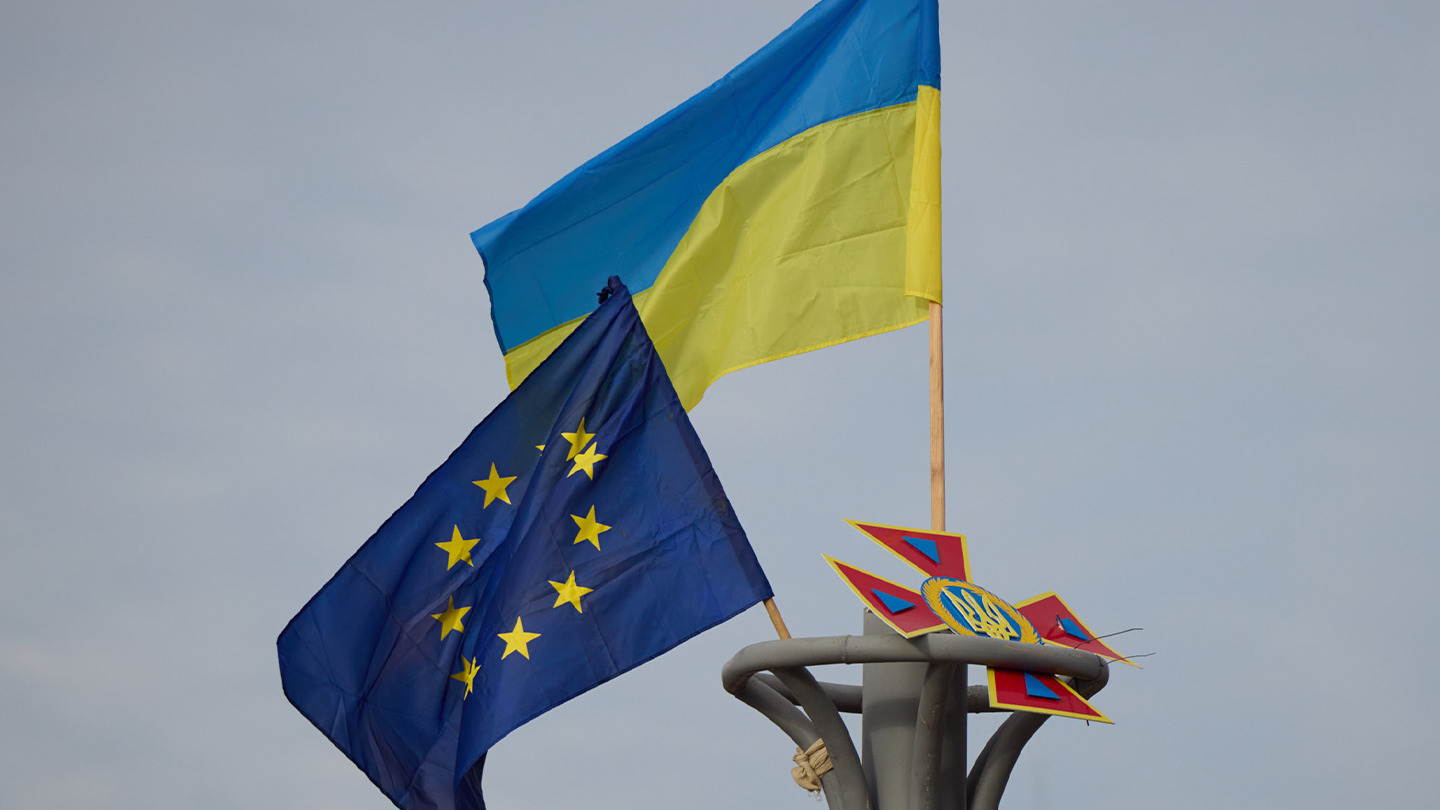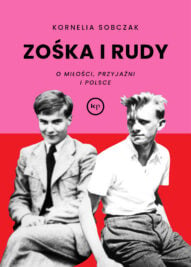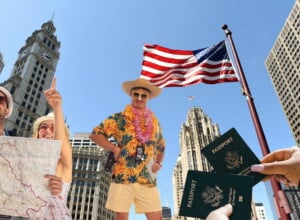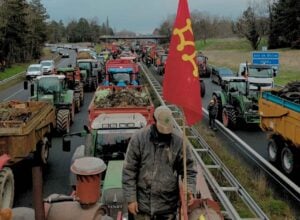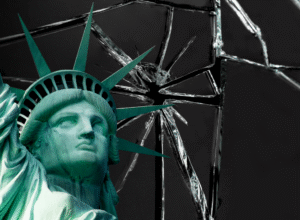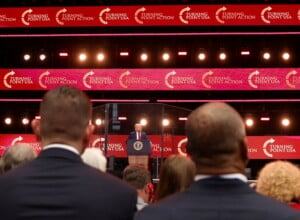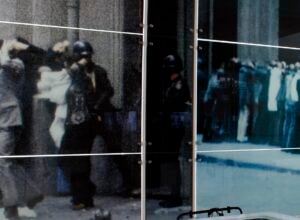Kaja Puto: Wojna w Ukrainie trwa już ponad dwa i pół roku. Jak zmieniło się pod jej wpływem ukraińskie społeczeństwo?
Maria Piechowska: Przede wszystkim je zjednoczyła, bo dawniej było to społeczeństwo silnie podzielone. Historycy i politolodzy ukraińscy spierali się o to, ile jest Ukrain – jedni byli zdania, że dwadzieścia dwie, czyli tyle, ile regionów, inni podkreślali podział na wschód i zachód. Po wybuchu pełnoskalowej wojny ta debata przestała mieć rację bytu. Wzrosła rola języka ukraińskiego, prorosyjskie poglądy odeszły do lamusa, wierni opuścili Ukraiński Kościół Prawosławny Patriarchatu Moskiewskiego. Społeczeństwo masowo zorientowało się na zachód.
Zukrainizowały się także miasta, które wcześniej pełne były śladów rosyjskiej tożsamości. Na ulicach Odesy, którą niedawno odwiedziłam, flaga ukraińska namalowana jest na każdym budynku. Cokół, na którym stał kiedyś pomnik carycy Katarzyny, przekształcony został w miejsce pamięci poświęcone poległym żołnierzom. A plac Katarzyny nazywa się placem Europejskim.
Wojna wyzwoliła także ogromną mobilizację społeczną.
Wcześniej jej nie było?
Bywała – ukraińskie społeczeństwo obywatelskie to fenomen na skalę światową. Gdyby nie Pomarańczowa Rewolucja, a potem Rewolucja Godności i bataliony ochotnicze w Donbasie, Ukrainy by już nie było. Mówimy o zwykłych ludziach, którzy biorą sprawy w swoje ręce: angażują się w działanie, organizują. Jednak po wybuchu pełnoskalowej wojny Ukraińcy przeszli sami siebie. Zbiórki na sprzęt, angażowanie się w pomoc np. poprzez wytwarzanie siatek maskujących, pomoc uchodźcom wewnętrznym – to codzienność. Ale ukraińskie społeczeństwo obywatelskie pełni też ważną rolę watchdoga – patrzy władzy na ręce. Doprowadziło na przykład do przywrócenia konieczności składania przez deputowanych Rady Najwyższej oświadczeń majątkowych.
Słuchaj podcastu „Blok Wschodni”:
Mobilizacja społeczna po inwazji to też częściowo zasługa genialnej polityki informacyjnej Wołodymyra Zełenskiego – te wszystkie babcie, które rzucały ogórkami, traktory odholowujące rosyjskie czołgi czy wreszcie lansowane wszędzie nagranie rozmowy strażników granicznych z Wyspy Wężowej z rosyjskim okrętem wojennym.
Ukraińcy po dwóch i pół roku wojny nadal silnie wierzą w zwycięstwo. Ale to również pułapka. Bo dla większości zwycięstwo oznacza odzyskanie całego terytorium w granicach z 1991 roku. A, jak wiemy, jest to coraz trudniejsze.
Bohaterka jednego z moich reportaży powiedziała mi kiedyś, że wojna nauczyła Ukraińców asertywności. Że nauczyli się odmawiać, przeklinać, a nawet grozić. To widać chyba nawet na poziomie polityki zagranicznej prowadzonej przez Ukrainę.
To jest siła, a jednocześnie zagrożenie. W rozmowach z ukraińskimi politykami czy ekspertami często poruszam temat przyszłości stosunków polsko-ukraińskich. Zwracam uwagę, że negocjacje unijne będą od Ukrainy wymagały zabiegania o wsparcie każdego z państw, dla których jako członkini Unii stanie się konkurencją. Czyli na przykład z Polską – niewątpliwie tematem negocjacji między nami będzie rolnictwo. To jest dla większości z nich trudne do zrozumienia – zakładają, że skoro Ukraina broni Europę przed Rosją, to powinna pewne rzeczy dostać w zamian.
Ukraińskie społeczeństwo uwewnętrzniło sobie silne poczucie mesjanizmu. Jest on niewątpliwie potrzebny w czasie wojny, natomiast władze ukraińskie powinny nauczyć się również, że to, co działa i jest potrzebne w sytuacji wewnętrznej, utrzymania wysokiego morale, niekoniecznie przyniesie pożądane efekty w polityce zagranicznej. Polityka z zasady nie opiera się na emocjach.
Wojna oznacza również militaryzację dyskursu. Dostrzegam w Ukrainie w tym kontekście dwie tendencje. Z jednej strony ukraiński internet pełen jest brutalnych memów o „rzeźni kacapów” – tym emocjom naprawdę trudno się dziwić – z drugiej widać wiele starań, by pokazać, że Ukraińcy różnią się od Rosjan, że nawet w warunkach krwawej wojny są sprawiedliwi, empatyczni, humanitarni.
Oczywiście, w Ukrainie jest dużo nienawiści do Rosji – to coś, czego wcześniej nie było.
Widziałam ostatnio uliczną sondę, podczas której prowadzący pytał prowokacyjnie Ukraińców na ulicy, czy są rusofobami. I jedna pani odpowiedziała bardzo znacząco, że żadnej rusofobii w Ukrainie nie było, ale niech Rosjanie poczekają, aż dorosną dzieci, które przeżyły wojnę, to zobaczą, co to jest rusofobia.
Być może gdyby nie pełnoskalowa inwazja, gdyby Władimir Putin ograniczył się do wojny w Donbasie, Ukrainy mogłoby już nie być, bo prorosyjska i proeuropejska część społeczeństwa pożarłaby się ze sobą i w rezultacie ta pierwsza opcja by wygrała. Dziś jednak w Ukrainie nie ma już opcji bycia sympatykiem Rosji.
Tak czy inaczej, ta narracja „humanitarna” wydaje się silniejsza. Ukraińcy nie chcą być bestialscy jak Rosjanie mordujący i torturujący cywilów w zajmowanych miejscowościach, co np. działo się w Buczy i w innych podkijowskich miejscowościach. Dla nich ważne jest zachowywanie się zgodnie z normami społecznymi i humanitarnymi. Są świadomi, że Zachód tego od nich oczekuje, ale również sami utożsamiają się z taką postawą. Odcinają się od „barbarzyńskiej” Rosji. Widać to po sposobie traktowania jeńców wojennych, a ostatnio również po tym, jak przeprowadzana jest i komunikowana tzw. operacja kurska. Ukraińcy dają mocny przekaz, że są gotowi na utworzenie korytarzy humanitarnych, których nie chce Rosja, że dbają o cywilów na zajętych terenach.
Akcentuje się również empatyczne podejście żołnierzy do pozostawionych przez Rosjan zwierząt. I choć oczywiście porzucanie zwierząt przez ewakuujących się w panice ludzi zdarza się po obu stronach granicy, ważne jest, co się z nimi dzieje potem. Czy istnieją organizacje, które zawalczą o te zwierzęta, zaopiekują się nimi, oraz czy stanie się to tematem debaty.
Jednocześnie poparcie dla posiadania broni rośnie.
Oczywiście, każdy chce móc się obronić. Wszyscy pamiętają sceny z Buczy i podobne z innych miejscowości. Według szacunków ministra spraw wewnętrznych Ihora Kłymenki Ukraińcy mogą posiadać obecnie nawet do pięciu milionów niezarejestrowanych sztuk broni. Ta militaryzacja społeczeństwa to jednak coś więcej. W badaniach Centrum Razumkowa z marca 2024 roku prawie trzech na czterech Ukraińców wskazało, że akceptuje wprowadzenie edukacji wojskowo-patriotycznej już od przedszkola.
W obliczu zagrożeń ze strony Rosji wzmacnia to ich odporność, jednak długofalowo może odbić się na życiu społecznym negatywnie. Tysiące weteranów z traumą wojenną w połączeniu z powszechnym dostępem do broni to przepis na wzrost przestępczości. Potencjalna radykalizacja byłych żołnierzy będzie zapewne również polskim problemem, bo jakaś ich część przyjedzie w poszukiwaniu pracy czy po prostu dołączając do rodzin. Jednocześnie będzie to temat, który z pewnością będzie chciała eksploatować rosyjska propaganda, by nastawić Polaków przeciwko Ukraińcom.
Co robi ukraińskie państwo dla weteranów i czy mogłoby robić więcej?
Temat wsparcia weteranów nie jest nowy – wojna w Ukrainie trwa od 2014 roku. Jednak obecnie mówimy o zupełnie innej skali. Weterani, zwłaszcza ci, którzy zostali ranni, otrzymują pewną pomoc od państwa. Flagowym projektem jest lwowskie Centrum Rehabilitacji Unbroken, które skupia się na kompleksowej pomocy ofiarom wojny. Ale potrzeba również systemowego wsparcia weteranów w powrocie do normalnego życia. Tutaj przed Ukrainą jest jeszcze wiele pracy.
Weterani mają też często problem ze znalezieniem pracy. Wielu pracodawców boi się ich zatrudniać ze względu na potencjalne problemy psychiczne lub argumentując, że żołnierz, który wydawał rozkazy, nie odnajdzie się jako podwładny. Do tego rynek pracy – a przy okazji i ukraińskie miasta – nie jest dostosowany do osób z niepełnosprawnościami. Na szczęście Ukraina ma spory potencjał, by to zmienić – ze względu na wysoki poziom cyfryzacji społeczeństwa i aktywność sektora IT.
Kłopoty ze zdrowiem psychicznym dotyczą nie tylko weteranów.
Straumatyzowane jest całe społeczeństwo. Według szacunków Światowej Organizacji Zdrowia problemów psychicznych – przede wszystkim PTSD [zespołu stresu pourazowego – przyp. aut.], zaburzeń lękowych i depresji – doświadcza około 10 milionów Ukraińców, czyli mniej więcej co trzeci mieszkaniec kraju. System ochrony zdrowia jeszcze przed wojną nie był zbyt wydolny, jeśli chodzi o pomoc psychiatryczną, a teraz dodatkowo brakuje mu kadr. Wielu medyków poszło służyć w armii, inni wyjechali – na przykład do Polski, która jest bardzo chłonnym rynkiem, jeśli chodzi o lekarzy i pielęgniarki z Ukrainy. W dodatku wiele placówek zostało zniszczonych, co jednocześnie utrudnia skuteczną pomoc ze strony państwa.
Jak zatem pomagają sobie Ukraińcy?
Rośnie oczywiście zrozumienie dla kwestii związanych ze zdrowiem psychicznym. Media poświęcają dużo uwagi temu, jak sobie radzić ze stresem wojennym. Ale przy tej skali problemu i przy braku specjalistów problem będzie dotykał społeczeństwo przez dekady.
W obliczu słabego wsparcia dla weteranów opieka nad nimi spoczywa w dużej mierze na barkach kobiet – ich żon czy matek. Czy wojna oznacza regres w kwestii praw kobiet?
Wręcz przeciwnie. Każda wojna przynosi emancypację kobiet – zawsze tak było i będzie. Nie chcę powiedzieć, że sytuacja ukraińskich kobiet była przed wojną zła, ale z pewnością role płciowe czy podziały między światem damskim a męskim były silniejsze niż w Polsce. Kobiety rzadziej prowadziły samochody, na imprezach rodzinnych często można było spotkać podział na stolik damski i męski. To się zmieniało na przestrzeni lat, ale wojna mocno tę zmianę przyspieszyła.
Kobiety muszą radzić sobie same – stały się głowami rodzin. To one, jako uchodźczynie, muszą się odnaleźć w nowym środowisku. Niektóre zgłaszają się też do armii. Wiele ukraińskich kobiet zaczęło podejmować prace w zawodach, które wcześniej były uznawane za „męskie”. Pracują jako hutniczki, a nawet górniczki.
To wynik braków kadrowych. Znamy skalę wyludniania się Ukrainy?
Nie znamy dokładnych liczb, bo w Ukrainie od lat nie było spisu powszechnego. W 2022 roku mówiono o 41 milionach mieszkańców, a obecne szacunki dotyczące sytuacji po wojnie wahają się od 25 do 37 milionów osób.
Co najmniej 6,5 miliona uciekło na Zachód, nieznana liczba Ukraińców wyjechała też – lub została zmuszona do wyjazdu – do Rosji. Nieznana jest dokładna liczba ofiar wojny – oficjalne dane ONZ mówią o 11,5 tysiącach zabitych, ale według szacunków agencji AP w samym Mariupolu mogło zginąć nawet 75 tysięcy osób. Z kolei straty personelu wojskowego według szacunków dziennikarzy mogą sięgać 100 tysięcy osób. Do tego dochodzi coraz niższa dzietność. W historii niepodległej Ukrainy jej współczynnik nigdy nie sięgnął poziomu zastępowalności pokoleń (2,1–2,2), jednak według wojennych szacunków wynosi obecnie zaledwie 0,7.
Jakaś część uchodźców nie wróci do Ukrainy z zachodnich krajów, a dopóki trwa wojna, nie ma też mowy o perspektywach na uzupełnienie tych braków migrantami. Ukraina się wyludnia. To rodzi szereg poważnych problemów, które tylko pogłębią się po zakończeniu wojny. Ukraiński system emerytalny oparty jest na solidarności pokoleń, poza tym już dziś brakuje rąk do pracy.
A czy reintegracja uchodźców będzie sporym wyzwaniem? Niektórzy spośród Ukraińców, którzy zostali w kraju, nazywają uciekinierów zdrajcami. Byłam w Mikołajowie kilka dni temu po tym, jak przestał być intensywnie ostrzeliwany i zaczęły się masowe powroty mieszkańców. Ci, którzy przeżyli w mieście najgorsze dni, denerwowali się na tych powracających: że gdzie byli, kiedy miasto ich potrzebowało, że nie potrafią jeździć po nieoświetlonych ulicach, że są niezaradni i oczekują od władz miasta cudów.
Z jednej strony mówi się o zdradzie, a z drugiej – że to kobiety, które dbają o przyszłość narodu, czyli ukraińskie dzieci, i że to ważne, żeby te dzieci miały zapewnione bezpieczeństwo. Pewnie będą wokół tego jakieś napięcia, ale moim zdaniem większy konflikt narodzi się między weteranami i mężczyznami, którzy nie zdecydowali się walczyć. Ci, którzy nie walczą, w większości również przykładają się do obrony kraju – na przykład pracując i wspierając tym samym działanie gospodarki, która jest niezbędna do przetrwania państwa. Ale weteran powie: nie, nie jesteś patriotą, bo się nie zaciągnąłeś.
Mimo wszystko gospodarka ukraińska ledwo przędzie. Ważne przed wojną zakłady przemysłowe nie funkcjonują. Czy Ukraińcy mają pomysł na powojenne odbicie się od dna?
Gospodarka ukraińska radykalnie się zmieni, a właściwie już się zmienia. Część firm relokowała się na zachód, ale część – w tym wspomniane przez ciebie zakłady przemysłowe – została po prostu zrównana z ziemią – np. zakłady Azowstalu w Mariupolu czy Azoty w Siewierodoniecku. Wielką nadzieją jest sektor IT, który rozwija się pomimo wojny. To dzięki niemu Ukrainie udało się osiągnąć tak niezwykły poziom cyfryzacji. Przykładem jest choćby państwowa aplikacja Dija – to praktycznie państwo w internecie. Z jej pomocą można opłacić podatki, otworzyć firmę, wziąć udział w przetargu, zarejestrować urodzenie dziecka, a od niedawna nawet wziąć ślub online.
Kolejną branżą, z którą wiąże się nadzieje, jest przemysł zbrojeniowy, który rozwija się pomimo nieustających ataków Rosji na tego rodzaju zakłady. Wojna wymusiła nie tylko produkcję, ale i tworzenie nowych rozwiązań – flagowym przykładem są ukraińskie drony.
Operacja kurska rozbudziła nadzieję na sprawiedliwszy wynik wojny. Czy perspektywa odbudowy kraju po wojnie budzi lęki, czy raczej nadzieje?
Trudno powiedzieć. Myślę, że Ukraińcy nie wybiegają myślami tak daleko. Cieszą się z pierwszej od wielu miesięcy pozytywnej informacji z frontu, czyli z operacji kurskiej, ale nie spodziewają się rychłego zakończenia konfliktu. Mają świadomość, że łatwo nie będzie i jeszcze dużo przed nimi. Dlatego ważne jest dalsze wspieranie przez Polskę i inne państwa sojusznicze. Żeby wiedzieli, że o nich nie zapomnieliśmy.
**
Maria Piechowska – analityczka ds. Ukrainy w programie Europa Wschodnia Polskiego Instytutu Spraw Międzynarodowych. Zajmuje się polityką zagraniczną i wewnętrzną oraz zagadnieniami społeczno-kulturalnymi Ukrainy, a także migracjami. Absolwentka Instytutu Etnologii i Antropologii Kulturowej Uniwersytetu Warszawskiego, uzyskała absolutorium w Studium Europy Wschodniej UW. Współautorka książki Niemiecki proszek do prania i polnische wirtschaft. Polscy robotnicy sezonowi w Niemczech (Scholar 2016).

 Wspieraj
Wspieraj 

 Wspieraj
Wspieraj  Wydawnictwo
Wydawnictwo 
 Zaloguj się
Zaloguj się 
